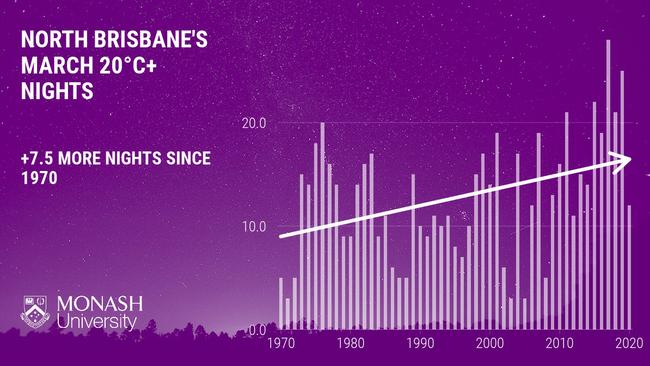North Brisbane is experiencing higher overnight temperatures, according to Bureau of Meteorology data
Dr Christa Pudmenzky explains how north Brisbane's climate is warming. Plus, how do increasing temperatures impact our farmers?

HyperLocal
Don't miss out on the headlines from HyperLocal. Followed categories will be added to My News.
Data from the Bureau of Meteorology suggests that overnight temperatures in north Brisbane are warming.
Back in 1970, residents saw around nine March nights reaching at least 20 degrees.
Nowadays, it's more like 16 nights - seven more than 50 years ago.
More than half the month now receives warm overnight temperatures.
Voices from your community
Nundah resident Chris Taylor believed the seasons had 'shifted' by a couple of months.
"Seatbelt burns are appearing in autumn and the summer heat has me wondering how I haven't spontaneously combusted.
"Everything is warming up and every year it becomes more uncomfortable.
"Short-term it's annoying, but in the long run it's going to drastically affect how we live."
Community voices like Chris' tell us how residents and business owners in North Brisbane feel about their local climate. If you would like to contribute your voice to our column, you can fill out our 5-minute survey here.
Did you know?
Australia's warming climate is affecting our farmers.
Higher temperatures can shorten the growth period of particular crops, such as wheat and rice, which can impact flowering and harvest times.
While increased night time temperatures may reduce the size of the fruits plants can grow.
Sunburn and extreme weather events can also reduce the quality of crops, lowering the price that farmers can sell their produce for.
Want more information on how your climate is changing? Check out last week's article here.
Dr Christa Pudmenzky is a climate scientist at the University of Southern Queensland.
This column is part of a collaboration between the Monash Climate Change Communication Research Hub and News Corp to deliver hyperlocal weather and climate information.
Follow the Hub on Twitter to join the conversation.

